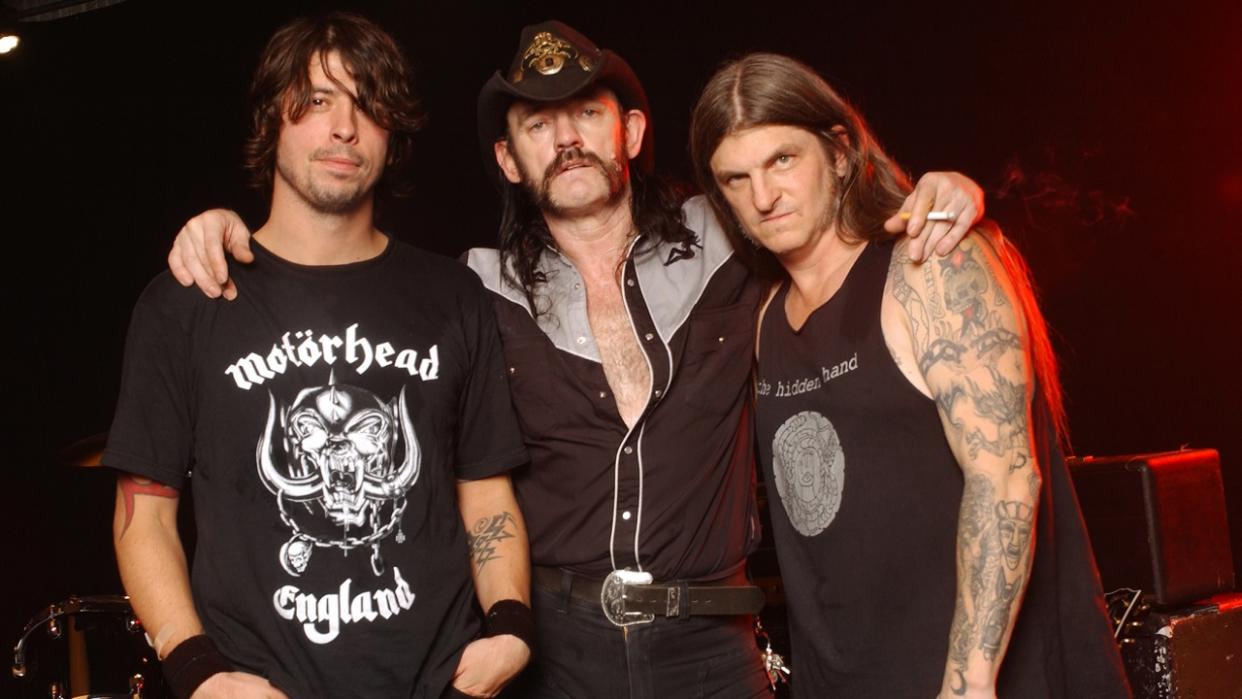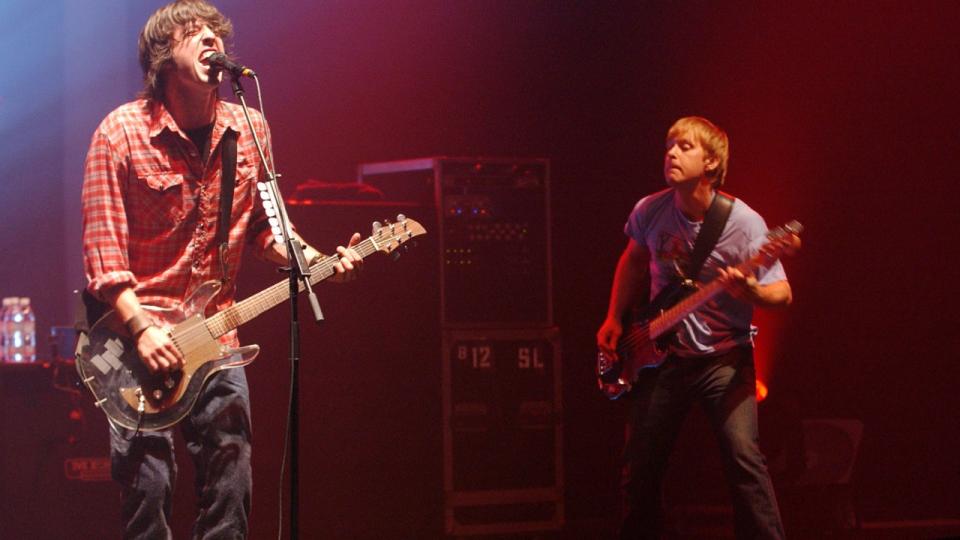"Dave was really nervous about talking to these guys": Why Dave Grohl ditched the Foo Fighters to make extreme metal supergroup Probot, featuring members of Venom, Sepultura, Motorhead and more

- Oops!Something went wrong.Please try again later.
On July 3, 1983, 14-year-old Springfield, Virginia schoolboy Dave Grohl went to Washington DC for a free Rock Against Reagan festival headlined by Dead Kennedys. The gig would change his life. “I had just discovered punk rock and here were some of the best punk bands in America playing on my doorstep,” he recalled in 2009.
‘When I showed up [Texan ‘crossover’ thrash/hardcore band] D.R.I. were onstage. I couldn’t even believe [what I was seeing], so much so that afterwards I bought their 22-song 7” [debut EP] from their singer out of their van. That whole night… I’ve got chills just thinking about it. It was so unbelievably moving. It was like our own personal Altamont, our Woodstock. And that’s when I said, “Fuck the world, I’m doing this.”
Many years later, in the spring of 1999, Dave returned home to Virginia. He bought a house in Alexandria in which, with the help of his producer friend Adam Kasper, he built a recording studio. It was here that Foo Fighters would record their third album, There Is Nothing Left To Lose. Both the album, and its laid-back first single, Learn To Fly, would win Grammy Awards, rubber-stamping Foo Fighters’ status as one of the world’s best-known rock bands. But now Dave Grohl’s inner metalhead was screaming to be heard.
Purely for fun, he began recording old-school metal riffs with Adam, later adding bass and drums. When he played these instrumentals to his friend Matt Sweeney, former frontman of post-hardcore band Chavez, the pair started fantasising about which underground metal vocalists could sing on the tracks if they were to create the compilation album of their teenage dreams. In 2001, after hearing Dave enthuse about this idea, MTV News reported that, “inspired by Santana’s [30 million-selling album] Supernatural” he was intent upon creating “the ‘death metal’ version of the multi-artist project”, under the name Probot.
Dave Grohl: “The whole thing started in February of 2000. Foo Fighters had made There Is Nothing Left to Lose in 1999, which was a pretty mellow record for us. We went out and played a lot of those songs live. I would find myself listening to Sepultura’s Chaos A.D. before going onstage, and then singing a song like Learn To Fly. Which I thought was kind of funny - like, ‘What am I doing with my life, man?’
When I was young, my favourite bands were fucking Bad Brains, Void, Minor Threat, MDC, D.R.I., Corrosion Of Conformity, Slayer, Trouble, Voivod, Venom, The Obsessed and Mercyful Fate, and here I am playing music that sounds like the fucking Eagles or something!”
Matt Sweeney: “MTV really said Probot was influenced by Santana? Ha ha ha! I don’t remember ever talking about Santana, but I like that, let’s leave that in! We were hanging out a lot and Dave said, ‘I have this idea about doing a record with all these amazing metal singers that were overlooked, particularly the 80s underground metal dudes’, and I said, That’s a great idea.
We came up a dream wish-list of who that might include, and Dave was like, ‘OK, so this song could be for that singer…’ He sorta had it all mapped out in his head, and it was wild watching him record the instrumentals. So yeah, we were totally trying to cash in, à la Santana, on the incredible demand for underground 80s metal vocalists, we figured we had to get in on that.”
The list that Dave and Matt compiled for Probot read like a who’s who of the 80s underground metal scene. It included Sepultura’s Max Cavalera, Snake from Voivod, Cronos from Venom, former Napalm Death vocalist Lee Dorrian (then fronting Cathedral), King Diamond, Celtic Frost’s Tom G. Warrior, D.R.I.’s Kurt Brecht, ex-Obsessed frontman Wino, and Lemmy from Motörhead, among others. Matt Sweeney was tasked with reaching out to each singer, explaining the concept of what Grohl was trying to do. One by one, the singers signed on.
Matt: “I gotta give almost all the credit here to Kevin Sharp from Brutal Truth, who’s an old friend of mine, because he got me the numbers, and also he knew a lot of those guys, and knew the best way to approach them. Some of them knew Dave already, and if not, they’d heard of Nirvana or Foo Fighters, at least. But Dave was really nervous about talking to these guys, and was kinda shy about it, so I made the calls. That’s when I found out that Cronos was an aerobics instructor, which was pretty funny to me at the time.”
Cronos (Venom): “I was sent the raw music for pretty much all of the songs. There was quite a lot of them where I was like, ‘I don’t know what to do with this’, because it was so not like what I’d done before. So when Dave said, ‘Track three is yours’, I was so relieved because that was the one I wanted: I was buzzing because that was my favourite one on there.”
Lee Dorrian: “When Dave’s old band, Scream, came back to England in ’88 I put them on at a place called The Inn Hotel in Coventry. They had nowhere to stay and I had a council flat in Coventry, 52 Hillfields House, so they piled back to my flat. There were holes in the windows and doors made by some Dutch band who’d stayed the week before, and I had to go around to a squat around the corner to nick some furniture. But they were just happy to have a roof over their heads. And they were good company. Dave was a particularly witty character. He was really knowledgeable and excited about music, too.
Napalm had just recorded a session for [Radio 1 DJ] John Peel and Dave really wanted to hear it, so I played it. It completely floored them, they thought it was nuts. Dave and I spent the rest of the night talking about Sabbath and Celtic Frost and Voivod.”
Matt: “I remember King Diamond walking me through his plans for his vocals, doing the screams and laughs down the phone line. It was so thrilling, my hair was standing on end.”
Dave: “Man, every time I hear King Diamond, I just think about the sheets of acid I was taking listening to [1987 solo album] Abigail and [Mercyful Fate’s] Don’t Break the Oath. A lot of time was spent screaming songs like Corpse Without A Soul with a fuckin’ beer bong in my hand.”
Matt: “It was so fucking cool talking to all these guys, and they really fucking delivered. Cronos sent us some bass overdubs, and we were freaking out. And he had three different lyric ideas…”
Cronos: “One was like a sleazy, red light area, ‘Going out for a whore’ kinda song, another one was about young guys going out for a fight and drinking on the town, and then I also wrote Centuries Of Sin, which was the Venom-ous one. Dave went, ‘I just want you to do your thing on it. Don’t think about Dave Grohl, don’t think about Foo Fighters and Nirvana, think as if you were doing a Venom song.’ And I was like, ‘Brilliant!’”
Matt: “The only people we couldn’t get were Tom Araya from Slayer and Phil Anselmo. I remember Dave actually rented a party bus for us to go see Slayer in LA with Pantera opening and we were backstage, and Tom Araya and Phil were right there, but we were too nervous to fuck with him.”

The exact date on which the Probot album was considered finished is up for debate, but by 2003, Dave had 12 songs (including I Am The Warlock, with Jack Black on vocals, intended as a hidden track). All but Lemmy’s contribution, Shake Your Blood, recorded in LA, were delivered by FedEx. Now he had to find a home for the record.
Dave took meetings with a number of record labels, but was unimpressed. Finally Pete Stahl, the former frontman of Scream, suggested Southern Lord, the label founded by his Goatsnake colleague, Greg Anderson.
Greg Anderson: “I had started Goatsnake with Pete Stahl so I’d run into Dave now and again, and every time I’d see him we’d sequester ourselves in a corner and talk about metal. He was this giant pop star in my eyes, but all he wanted to know about was what cool metal records he should go out and buy, and I thought that was cool.
Dave would mention to me that he was putting together these songs and he mentioned Lemmy and Cronos, so it was just kinda talk; he never, ever mentioned business to me. And then the way I heard the story from Pete Stahl was that one day Dave was playing Pete songs from it and saying, ‘What the hell should I do with this stuff? I don’t feel like a major label will understand’, and Pete said, ‘Well, what about Anderson’s label?’ I laughed and thought nothing would come of it, but then Dave called me and said, ‘Hey, I wanna talk about this Probot record…’”
Dave: “Major labels would have taken this record and slapped my name real big on a sticker on the front of the CD - ‘Dave Grohl’s fuckin’ metal band.’ And that would have ruined everything, because, to me, the focus should be on these vocalists. Some of the people at labels were asking who these singers are and why they should be on the record, and it was important that I give the album to someone who understood these people and this kind of music and who wouldn’t take advantage of the easy sell.”
Probot emerged on Southern Lord on February 10, 2004. It’s a gnarly, nasty, and authentic collection, the work of men who know what it is like to taste blood, and to find themselves with puke on their shoes. In the hands of another superstar rock musician, it could have been viewed as a vanity project… and everybody hates a tourist.
Instead, it’s a celebration not just of true underground metal, but of the values that informed that community: the point of underground metal, and indeed thrash and hardcore punk, was that its tonality and totality was such that it discouraged the attentions of the poseur. Probot, the album, never begged for one’s attention, and Probot, the collective, never played a gig, ensuring that, with its 20th anniversary just over the horizon, its purity remains intact.
Greg: ‘I’ve been told by several people that Probot was their gateway to check out Wino’s band, or Corrosion Of Conformity for the first time. It was like an introduction to this music, like, Dave recommends… We got a lot of attention for it, and the label profile as a whole was really elevated. Having that record in our catalogue was a great foot in the door for us.”
Kurt Brecht (D.R.I.): “It was a fun idea to be a part of. I don’t really know Dave Grohl, still, but it seems to me that Dave has got what every musician wants: freedom.”
Dave: “I can’t tell you how much it means to have the luxury of this opportunity. Not only of Probot, but all the opportunities that success allows me. It’s important to extend yourself to other types of music, to other types of people. It’s good for your fucking soul, for your fucking heart. It turned into something so beautiful that I’d hate to taint it by trying to do it again.”


